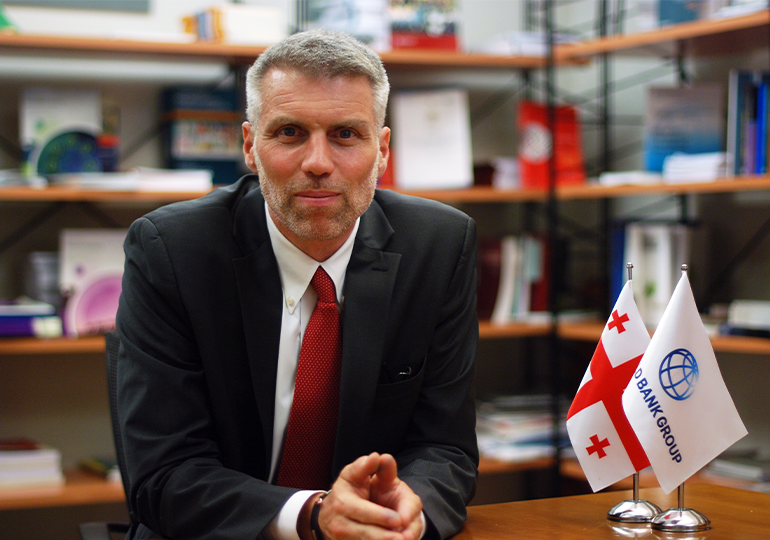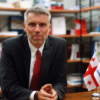One thing has been clear to me ever since I arrived in Georgia in the summer of 2019. It is a beautiful, breathtaking country – and it is truly refreshing to see that so many Georgians deeply care about nature and the environment.
And they are increasingly working to protect them. In a survey by the Regional Environmental Center for the Caucasus, almost all respondents indicated that climate change is affecting Georgia, while in another survey by UNICEF, one third of Georgian youths reported they engaged in volunteer work to protect the environment in various ways.
This bodes well for Georgia’s aspiration for EU membership. Becoming a member of the EU means “greening” Georgia’s growth and aligning with the European Green Deal, soon to be a defining feature of the EU’s approach to development.
So how can Georgia transition to greener and more climate resilient growth? In addition to changing attitudes and personal choices, it is also about economics. The World Bank’s latest report Georgia: Towards Green and Resilient Growth outlines some opportunities.
The report analyzes the cost of environmental degradation and opportunities for enhancing natural capital in the forest sector. It offers pathways to prioritize resource allocation for a greener economic recovery in the wake of the COVID-19 pandemic, and sustainable growth for years to come. I’d like to share six of our most important findings.
First, we found that the effects of climate change in Georgia, like elsewhere, will disproportionately impact the poor—many of whom directly depend on land for their survival and livelihood. Temperature increases and reduced precipitation will negatively impact the agrarian, forest, and water sectors.
Second, without action, climate change-driven impacts could cost more than 6% of Georgia’s GDP! And climate change is not a rural versus urban issue either. We can see that urban settlements, including Tbilisi, increasingly suffer from extreme weather events that result in flooding, waterlogging, landslides, and damage to utility infrastructure.
Third, if we look to Georgia’s west – the Black Sea coast – we see many impacts there too. According to a recent World Bank report, the cost of environmental degradation in Georgia’s six coastal municipalities was estimated at 4-5% of coastal zone GDP in 2018, due to flooding, erosion, waste, and damage to agricultural soils and forests.
Fourth, Georgia’s impressive progress in economic growth is a shining example of what can be done with smart policies, hard work, and international cooperation. Yet, this has come at some cost. Air pollution is a growing environmental challenge in Georgia, and the economic cost of associated health impacts is estimated at more than $500 million annually. Here, there is a clear opportunity to do better for our own health and that of our children.
Fifth, when it comes to both air quality and economic development, forests are a key national treasure. Georgia has bolstered its forest sector regulatory framework through a comprehensive national system for sustainable forest management, and the adopted Forest Code provides the legal basis for improved management of this resource.
Finally, increasing the role of the private sector in embracing green growth is an important goal in this context. Greening businesses opens doors to innovation and makes jobs safer, healthier, and more productive. It is also essential for Georgia’s regional integration under the EU-Georgia Association Agreement.
The country’s relatively low per capita CO2 emissions are disproportionately high when compared against a unit of GDP. This indicates significant potential to make Georgia’s economy and key growth sectors (such as tourism, metal, and mining) “greener.” A strong “green” business sector will also generate new export opportunities for innovative forerunner industries, including forestry.
Georgia’s national development strategies emphasize the importance of sustainable development. For example, the Ministry of Economy and Sustainable Development has been undertaking vital work recently to develop the country’s green growth strategy. Working out new regulations for managing lead pollution is also a commendable, much-needed measure in this respect.
In the context of these positive dynamics, the World Bank is ready to strengthen its collaboration with Georgia’s policymakers and the private sector, as well as other development partners for a Green and Resilient Georgia.
The World Bank has in fact been partnering with Georgia on the Green Growth agenda for some time now, by harnessing the potential of digital development and promoting sustainable cities, cleaner transportation, and healthier buildings.
For instance, we examined energy efficiency, underheating, and the associated economic costs in public buildings, including schools. The results of the study were quite grim, pointing to significant health and economic impacts. The study also revealed that, in many rural schools, inefficient heating practices—the use of stoves and firewood and poor insulation of buildings—cause significant indoor and outdoor air pollution and underheating.
As part of our ongoing Inclusion, Innovation and Quality project, we are supporting the construction of new schools and modernization of existing schools and integrated preschools so that they are healthy for children, teachers, and the environment, and are resilient against any future climate-related weather shocks.
The World Bank is also helping Georgia with adaptation to climate impacts in coastal areas and the water sector. We are also supporting the implementation of the EU4Environment regional program of the European Commission to enhance delivery of ecosystem services and livelihoods that depend on them. Based on the national needs assessment, program activities in Georgia will focus on the sustainable use of forest resources and improved management of ecosystems under the “Emerald Network” – a network of protected areas with the objective of long-term protection of high conservation value species and habitats.
The continued implementation of the EU-Georgia Association Agreement supports Georgia’s aim to apply EU standards, creating an ambitious agenda in the environmental field.
Looking to the future, there is an emerging opportunity to further inform the Government of Georgia’s national development goals, including its Green Growth strategy, as well as to help with transitioning to a carbon neutral economy over the long term.
The World Bank is establishing a Georgia Green Transition Platform, which will inform Georgia’s NDC actions on decarbonization and adaption to climate change, promote technological innovation, and create opportunities for “green” jobs – all with an eye on fiscal prudence and cost efficiency.
I think it’s fair to say that we are all waiting for the excitement of growth, development, and opportunity to return once we overcome these trying times. And when we do, let us work together to make sure that Georgia’s natural wealth is at the heart of its Green Growth strategy.
Let’s all work towards a Georgia that is open, digital, and green!
World Bank Regional Director for the South Caucasus.

















